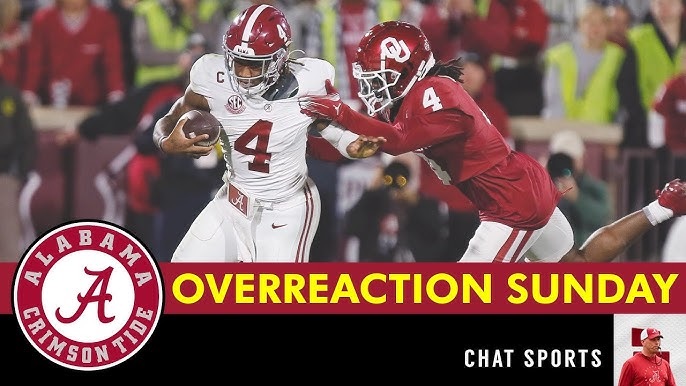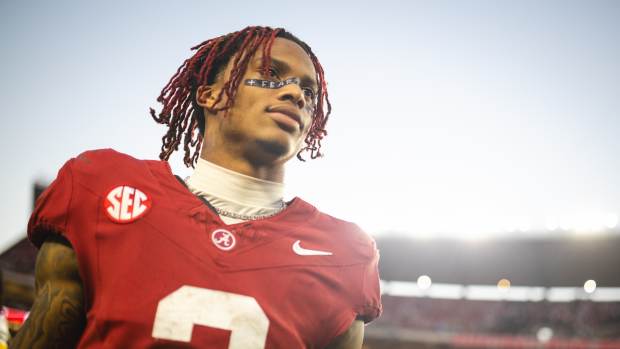
Kalen DeBoer Addresses Jalen Milroe’s Controversial Effort on Interception with Simple Message….
In the world of college football, where drama and controversy often go hand-in-hand with the game’s intense competition, moments of individual effort — or perceived lack thereof — can spark heated discussions. Such was the case in a recent game between the University of Washington Huskies and the Alabama Crimson Tide, when Alabama quarterback Jalen Milroe came under scrutiny for his apparent lack of effort during a critical moment. Milroe, a player with considerable talent, found himself at the center of a controversial play when he failed to chase down an interception during a key juncture of the game.
In the aftermath of the incident, Kalen DeBoer, head coach of the University of Washington Huskies, addressed the controversy with a calm, straightforward, and notably simple message. DeBoer, known for his no-nonsense, player-centric approach to coaching, sought to put the matter to rest, focusing on broader themes of accountability, responsibility, and the importance of effort in football.
The Incident: Jalen Milroe’s Lack of Effort After Interception
The incident in question took place during a pivotal moment in the game. Alabama, trailing by a narrow margin, was attempting to rally late in the fourth quarter. Milroe, under pressure, attempted a pass that was intercepted by Washington’s defense, setting up the Huskies for a potential game-sealing drive. However, what quickly became a talking point among fans and analysts alike was Milroe’s perceived lack of effort in chasing down the ball carrier after the interception.
While Milroe’s actions were not explicitly malicious or intended to be disrespectful, his lack of urgency was evident. As Washington’s defensive player sprinted toward the end zone, Milroe appeared to show little to no interest in pursuing the play. His posture suggested resignation rather than an attempt to salvage the situation.
For many, the sight of a quarterback not giving full effort on a critical play raised questions about his commitment to the game. Was this a case of fatigue or frustration? Or was it a more concerning reflection of Milroe’s mental state and leadership qualities? Such moments are often magnified in high-profile games, where even the slightest deviation from expectations can lead to widespread criticism.

The Media and Fan Backlash
As the play unfolded and the game ended, the media storm began. Sports analysts, talk show hosts, and fans took to social media to express their disappointment with Milroe’s perceived lack of effort. Some critics pointed to the interception as the defining moment of the game, with Milroe’s failure to chase down the play being seen as a microcosm of Alabama’s struggles in the contest.
The criticism came from multiple angles. Some questioned Milroe’s mental toughness and leadership. How could a player in such a high-pressure situation not give his all, especially with his team’s hopes on the line? Others took aim at Alabama’s coaching staff for not instilling a stronger sense of urgency in their players. After all, it’s one thing for a quarterback to make a mistake — it’s another for that mistake to be compounded by a lack of hustle or effort.
Despite the backlash, others came to Milroe’s defense, pointing out that he was still a young quarterback, one who had only recently taken over the starting role. They argued that players, especially in the heat of competition, can make mistakes or show lapses in focus, but that shouldn’t define their entire career or overshadow the potential for future growth.
Kalen DeBoer’s Response: Leadership Through Simplicity
Amidst the swirling controversy, Kalen DeBoer, the head coach of the University of Washington Huskies, took a measured approach to addressing the situation. While DeBoer’s team had just come off a significant victory over a powerhouse program like Alabama, he didn’t use the moment to gloat or point fingers at Milroe. Instead, DeBoer offered a simple but impactful message that focused on the broader principles of football.
“I think the one thing that we always try to emphasize with our team is effort,” DeBoer said during his post-game press conference. “It’s not always about the outcome of a single play, but how you respond to it. There’s a standard for effort in this game, and whether you’re up by 30 points or down by 30, that standard doesn’t change.”
The simplicity of DeBoer’s message resonated with many in the media and among fans. In a world where football often becomes a game of complex strategies and X’s and O’s, DeBoer’s focus on the core value of effort was refreshing. It wasn’t about excusing or defending Milroe’s actions, but rather emphasizing that every player, no matter the situation, is expected to give full effort on every play — and that includes the quarterback.
DeBoer’s statement wasn’t just an indictment of Milroe, but rather a broader lesson to all players in the sport. The message was clear: regardless of the scoreboard, every player on the field has a responsibility to play the game with integrity, and that means giving everything, even when it feels like the odds are stacked against you.

The Bigger Picture: Effort and Accountability in Football
At its heart, DeBoer’s message was about more than just Milroe’s interception. It was about the overall culture of effort and accountability that he strives to cultivate at Washington. Effort is often one of the first qualities that coaches emphasize when shaping their teams. While physical talent is important, it’s effort — both on the field and in practice — that often separates the good from the great.
DeBoer has built his reputation on developing teams that play with intensity and purpose. His Huskies are known for their high-powered offense and aggressive defensive schemes, but they are also known for their relentless pursuit of success, regardless of the circumstances. DeBoer understands that a lack of effort can be contagious, and that’s why he places such an emphasis on maintaining a consistent level of intensity throughout the course of a game.
From a coaching perspective, DeBoer’s response to Milroe’s actions highlights the importance of maintaining team-wide standards, particularly in the face of adversity. Football is, in many ways, a reflection of life. In both, there are times when things don’t go as planned, when mistakes are made, and when challenges seem insurmountable. But how one responds to those challenges, both as an individual and as part of a collective unit, is what truly matters. Effort is something that can always be controlled, and it’s one of the few things that remains constant in every situation.
Milroe’s Future: Learning From Adversity
While DeBoer’s comments focused on the importance of effort, it’s worth noting that Milroe himself will likely take something valuable from the experience. Young quarterbacks — especially those thrust into starting roles on nationally-ranked teams — are often faced with moments of adversity. Milroe’s moment of struggle against Washington, combined with the scrutiny that followed, may serve as a pivotal learning experience in his development.
In many ways, Milroe’s career thus far has been one of growth and adjustment. The redshirt sophomore had to step into the starting role for Alabama after the departure of Bryce Young, one of the most accomplished quarterbacks in Alabama history. Milroe’s early performances showed flashes of brilliance but also moments of inconsistency. The interception against Washington, and the subsequent fallout, represents yet another challenge he must overcome if he hopes to lead Alabama back to its championship-winning ways.
As Milroe reflects on the game, he will undoubtedly think about the lessons surrounding leadership, accountability, and the importance of effort in every phase of the game. Whether or not he was fully aware of his actions in that moment, Milroe now has the opportunity to learn from it, develop a stronger mental approach, and rise to the occasion the next time his team faces adversity.
Conclusion: A Simple but Powerful Message
In the end, Kalen DeBoer’s response to the controversy surrounding Jalen Milroe’s effort on the interception was both simple and profound. While other coaches or analysts may have gotten caught up in the drama or sought to place blame, DeBoer took the high road by focusing on what truly matters in football — effort. It wasn’t about excusing Milroe’s actions, but rather reinforcing the idea that effort is a non-negotiable standard that applies to everyone, regardless of the situation.
For Milroe, the message is clear: there will be times when things don’t go your way, but how you respond, both in terms of effort and leadership, defines who you are as a player and a person. For DeBoer, it was a reminder to his own team of the importance of consistency and accountability in all aspects of the game.
In a season filled with high stakes and high emotions, it’s moments like these that serve as valuable teaching tools — not just for the players involved, but for everyone watching the game unfold.





